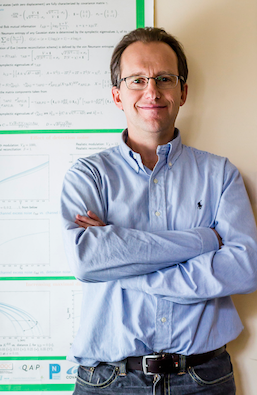Nicolas Cerf

|
Email: | ncerf (at) ulb.ac.be |
|---|---|---|
| Phone: | +32-2-650 28 58 | |
| Fax: | +32-2-650 29 41 | |
| Address: |
QuIC - Ecole Polytechnique de Bruxelles Université Libre de Bruxelles 50 av. F. D. Roosevelt - CP 165/59 B-1050 Bruxelles Belgique |
Short biography
Nicolas Cerf was born in 1965. He received a M.Eng. in Electronics and Telecommunication (1987), a M.Sc. in Physics (1988), and a Ph.D. in Physics (1993) from the Université Libre de Bruxelles (ULB). He was then awarded an individual Marie Curie fellowship (EU) and worked as a post-doctoral research associate at the Division of Theoretical Physics of the University of Paris XI in Orsay (France) for two years. His research mainly concerned quantum many-body systems and quantum Monte Carlo methods, but also extended to the statistical physics of combinatorial problems. In 1995, he joined the research faculty of the California Institute of Technology in Pasadena (USA) to work on quantum computation and information theory, which then became his main research interest. In 1998, he was appointed associate professor at the Ecole Polytechnique de Bruxelles (ULB), in charge of teaching classical and quantum information theory. In 2001, he started the Centre for Quantum Information and Communication (QuIC), the first group active in this field in Belgium at the time. He kept, since then, occasional visiting appointments at Caltech and JPL/NASA, and spent sabbatical periods at the Massachusetts Institute of Technology (MIT) in 2008 and 2010, as well as at the University of Arizona (Tucson) in 2022. He was promoted to full professor in 2009, and now also teaches quantum mechanics. He was elected a member of the Royal Academies for Science and the Arts of Belgium in 2009.
Nicolas Cerf received a Marie Curie Excellence Award in 2006. He also had earned the Caltech President's Fund award in 1997, the Alcatel-Bell scientific prize in 1999, and the prize of the Wernaers fund awarded by the Belgian National Fund for Scientific Research (FNRS) in 2000. He was a member of the steering committee of the programme “Quantum Information Theory and Quantum Computation” funded by the European Science Foundation (ESF), a member of the coordination action QUROPE (Quantum Information Processing and Communication in Europe), a member of the network of excellence QUIPROCONE (Quantum Information Processing and Communications Network of Excellence), and a member of the Advisory Board of the Coordination Action QUTE-EUROPE (Quantum Technologies for Europe). He is or has been involved in several European research projects under the 5th Framework Program, EQUIP (Entanglement in Quantum Information Processing and Communication), CHIC (Consortium for Hamiltonian Intramolecular Computing), RESQ (Resources for Quantum Computation), as well as under the 6th Framework Program, SECOQC (Development of a Global Network for Secure Communication based on Quantum Cryptography), COVAQIAL (Continuous Variable Quantum Information with Atoms and Light), QAP (Qubit Applications), and under the 7th Framework Program, COMPAS (Computing with mesoscopic photonic and atomic states), HIPERCOM (High-performance coherent quantum communications), and QALGO (Quantum Algorithmics). Within Horizon 2020, he participated in project QUCHIP (Quantum simulation on a photonic chip), ShoQC (Short-Range Optical Quantum Connections) in FET-Proactive programme, and AppQInfo (Applications and Hardware for Photonic Quantum Information Processing) in ITN Marie Curie programme. The project COVAQIAL, which he had coordinated during FP6, was selected as a nominee by the Grand Jury for the 2007 Descartes Prize for Transnational Collaborative Research.
He currently heads the Centre for Quantum Information and Communication (QuIC).
See detailed curriculum vitae.
Research
Nicolas Cerf's main contributions to quantum information science include the discovery of the role of negative (conditional) entropies in quantum information theory, the development of the first continuous-variable (Gaussian) quantum cloning and quantum cryptographic protocols, and the invention of the adiabatic quantum search algorithm. He also has established the fundamental quantum limit on the information transmission rate via (Gaussian) bosonic channels, thereby extending Shannon's most famous channel capacity formula to a quantum regime. In the context of quantum optics, he has uncovered a quantum two-photon interference effect arising in the amplification of light, akin to the celebrated Hong-Ou-Mandel effect but in an active optical medium. Recently, he has discovered that the bunching of partially distinguishable bosons may reach a point where it beats ideal (fully indistinguishable) bosons, hence disproving the common belief that boson bunching is necessarily maximized with indistinguishable bosons.
Nicolas Cerf's current research interests include numerous aspects of quantum information theory, quantum cryptography, quantum computation, quantum optics, and quantum foundations.
See publications list or click to see Nicolas Cerf's profile in Google Scholar.
Nicolas Cerf has been the PhD thesis advisor of Sofyan Iblisdir, Jérémie Roland, Gilles Van Assche, Louis-Philippe Lamoureux, Raul Garcia-Patron, Julien Niset, Loïck Magnin, Joachim Schäfer, Christos Gagatsos, Anaelle Hertz, Michael Jabbour, Zacharie Van Herstraeten, Matthieu Arnhem, Célia Griffet, and Benoît Seron. He also partly mentored, though not in the advisor role, the PhD thesis of Stefano Pironio, Frédéric Grosshans, Anthony Leverrier, and Carlos Navarrete-Benlloch.
The list of postdocs and senior scientists he has hosted includes Serge Massar, Sara Schneider, Frédéric Grosshans, Jaromir Fiurasek, Evgueni Karpov, Patrick Navez, Wiktor Zierkiewicz, Olga López Acevedo, Xavier Lacour, Stephen Brierley, Ludovic Arnaud, Aikaterini Mandilara, David Daems, Oleg Pilyavets, Mikhail Kolobov, Krishnakumar Sabapathy, Raúl García-Patrón Sánchez, Zoé Amblard, Levon Chakhmakhchyan, Uttam Singh, Siddhartha Das, Leonardo Goncalves Novo, Stephan De Bièvre, Hamed Mohammady, Michael Jabbour, and Tobias Haas.